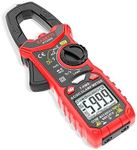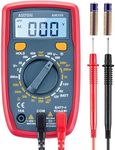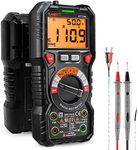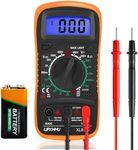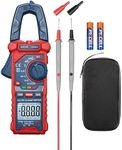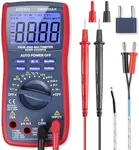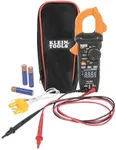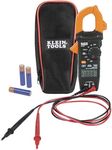Buying Guide for the Best Automotive Multimeters
Choosing the right automotive multimeter is important for anyone who wants to diagnose and troubleshoot electrical issues in vehicles. A good multimeter helps you measure voltage, current, resistance, and sometimes more, making it an essential tool for both beginners and experienced car enthusiasts. When picking a multimeter, it's important to understand the key features and how they relate to your needs, so you can select a device that is accurate, reliable, and easy to use for the types of vehicles and tasks you have in mind.Measurement FunctionsMeasurement functions refer to what the multimeter can test, such as voltage (both AC and DC), current, resistance, continuity, and sometimes additional features like diode testing, temperature, or frequency. The more functions a multimeter has, the more versatile it is. If you only need to check basic things like battery voltage or fuses, a simple model will do. If you plan to work on more complex systems, look for a multimeter with a wider range of functions.
AccuracyAccuracy tells you how close the readings are to the actual value. This is important because precise measurements help you diagnose problems correctly. Multimeters usually list their accuracy as a percentage. For basic car work, standard accuracy is often enough, but if you need to work on sensitive electronics or want more confidence in your results, look for a model with higher accuracy.
Display Type and SizeThe display shows your measurement results. Larger, clearer displays are easier to read, especially in dimly lit garages or under the hood. Some displays also have backlighting, which is helpful in low-light conditions. If you often work in tight or dark spaces, prioritize a multimeter with a big, backlit display.
Auto-Ranging vs. Manual RangingAuto-ranging multimeters automatically select the correct measurement range, making them easier and faster to use, especially for beginners. Manual ranging requires you to set the range yourself, which can be more precise but takes more time and knowledge. If you want convenience and simplicity, go for auto-ranging. If you prefer more control and already understand how to set ranges, manual ranging might suit you.
Durability and Build QualityDurability refers to how well the multimeter can withstand drops, bumps, and the rough environment of a garage. Look for features like a rubberized case or protective holster. If you plan to use the multimeter frequently or in tough conditions, choose one that is built to last.
Safety RatingsSafety ratings indicate how well the multimeter protects you from electrical hazards. Automotive work usually involves lower voltages, but it's still important to have a multimeter with proper safety certifications. Look for ratings like CAT II or CAT III, which show the meter is safe for automotive and light industrial use. If you work on hybrid or electric vehicles, higher safety ratings are even more important.
Probe Quality and AccessoriesThe quality of the test probes and included accessories can affect your experience. Good probes make it easier to get accurate readings and last longer. Some multimeters come with extras like alligator clips, temperature probes, or carrying cases. Think about what accessories you might need for your typical tasks and choose a multimeter that includes them or allows you to add them easily.


